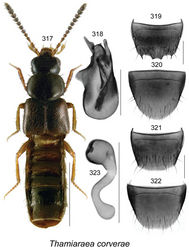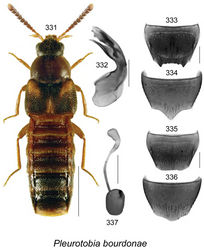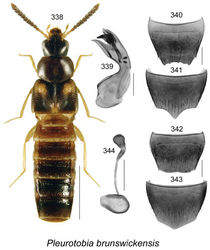Pleurotobia bourdonae
| Notice: | This page is derived from the original publication listed below, whose author(s) should always be credited. Further contributors may edit and improve the content of this page and, consequently, need to be credited as well (see page history). Any assessment of factual correctness requires a careful review of the original article as well as of subsequent contributions.
If you are uncertain whether your planned contribution is correct or not, we suggest that you use the associated discussion page instead of editing the page directly. This page should be cited as follows (rationale):
Citation formats to copy and paste
BibTeX: @article{Webster2016ZooKeys, RIS/ Endnote: TY - JOUR Wikipedia/ Citizendium: <ref name="Webster2016ZooKeys">{{Citation See also the citation download page at the journal. |
Ordo: Coleoptera
Familia: Staphylinidae
Genus: Pleurotobia
Name
Pleurotobia bourdonae Klimaszewski & Webster sp. n. – Wikispecies link – ZooBank link – Pensoft Profile
Holotype (male)
Canada, New Brunswick, Carleton Co., Jackson Falls, “Bell Forest”, 46.2200°N, 67.7231°W, 18.VIII.2008, R.P. Webster, coll. // rich Appalachian hardwood forest in Hapalopilus nidulans on dead standing beech tree (LFC). Paratypes: Canada, New Brunswick, Carleton Co., same data as holotype (1 ♀, LFC; 3 ♂, 2 ♀, RWC); same data except 20.IX.2008 (1 ♂, RWC). York Co., Canterbury, near “Browns Mtn. Fen”, 45.8876°N, 67.6560°W, 3.VIII.2006, R.P. Webster, coll. // Hardwood forest, on Pleurotus sp. on sugar maple (1 ♂, LFC). Quebec, Bellechasse Co., St. Raphael, 46.8078°N, 70.7344°W, 15.VII.2006, R.P. Webster, coll. // Mixed forest, on decaying fleshy polypore on dead standing poplar (1 ♀, RWC).
Etymology
This species is named for Caroline Bourdon (LFC) who works with us on many projects and has produced many images.
Description
Body length 3.8–4.0 mm, narrowly oval, robust, head, pronotum, most of elytra and posterior part of abdomen dark brown, elytra with a yellowish-red area or spot extending obliquely from each shoulder and a narrow one along suture in posterior half, base of abdomen, legs, antennae and maxillary palps yellowish brown (Fig. 331); integument moderately glossy, densely and coarsely punctate, especially on elytra and in tergal impressions; head much narrower than pronotum with large eyes, longer than temples, antennae with articles V–X increasingly broadening toward apex; pronotum sinuate basally and rounded laterally, broadest at middle and then abruptly narrowed apicad; elytra with prominent shoulders, broader than pronotum; abdomen subparallel, three basal tergites with deep impressions, each coarsely punctate. Male. Median lobe of aedeagus with bulbus moderately large, oval, tubus long, strongly produced ventrally, its ventral margin slightly sinuate, apex thin, narrow and acutely pointed in lateral view (Fig. 332); tergite VIII with apical margin broadly emarginate between two large lateral teeth, emargination weakly crenulate (Fig. 333); sternite VIII strongly, triangularly produced apically (Fig. 334). Female. Tergite VIII broadly truncate apically (Fig. 335); sternite VIII obtusely produced apically, with apex rounded (Fig. 336); spermatheca with capsule short, widely club shaped, stem narrow, curved (Fig. 337).
This species is externally similar to Pleurotobia brunswickensis, but its body is broader, more coarsely punctate, and less glossy, the integument is more reddish brown, and the median lobe of the aedeagus is shaped differently, with the venter less strongly sinuate in lateral view (Figs 318, 332).
Distribution
Known from QC and NB, Canada.
Natural history
Pleurotobia bourdonae was found in hardwood and mixed forests. Adults were found in Hapalopilus nidulans (Fr.) Kar. (Polyporaceae) on standing dead American beech (Fagus grandifolia Ehrh.) trees, in a Pleurotus sp. (Tricholomataceae) on a live sugar maple (Acer saccharum Marsh.), and in a decaying fleshy polypore (probably Hapalopilus nidulans) on a dead standing poplar. A description of the larva and biology of Pleurotobia tristigmata (Er.) [error for Pleurotobia tristigma Casey = Pleurotobia trimaculata (Er.)] is provided by Ashe (1990)[1].
Comments
The genus Pleurotobia Casey was previously represented in North America by one species, Pleurotobia trimaculata (Erichson) and its three synonyms, Pleurotobia suturalis Casey, Pleurotobia tristigma Casey, and Pleurotobia texana Casey (Ashe 1992[2]). The illustration of the median lobe of the aedeagus and spermatheca of Pleurotobia trimaculata is provided by Ashe (1992)[2]. The two new species described in this paper are easily distinguishable from Pleurotobia trimaculata by the differently shaped median lobe of the aedeagus and the weak crenulation of the apical margin of male tergite VIII between two large lateral teeth (Figs 333, 340).
Original Description
- Webster, R; Klimaszewski, J; Bourdon, C; Sweeney, J; Hughes, C; Labrecque, M; 2016: Further contributions to the Aleocharinae (Coleoptera, Staphylinidae) fauna of New Brunswick and Canada including descriptions of 27 new species ZooKeys, (573): 85-216. doi
Images
|
Other References
- ↑ Ashe J (1990) Natural history, development and immatures of Pleurotobia tristigmata (Erichson) (Coleoptera: Staphylinidae: Aleocharinae). The Coleopterists Bulletin 44(4): 445–460.
- ↑ 2.0 2.1 Ashe J (1992) Phylogeny and revision of genera of the subtribe Bolitocharina (Coleoptera: Staphylinidae; Aleocharinae). The University of Kansas Science Bulletin 54(10): 335–406.


